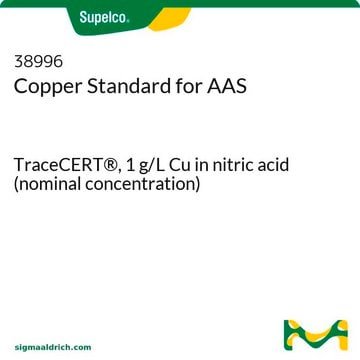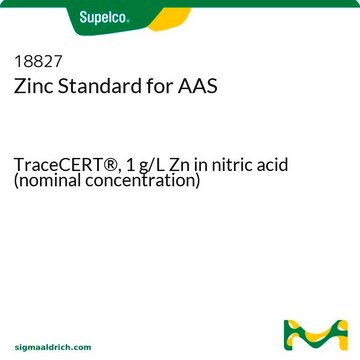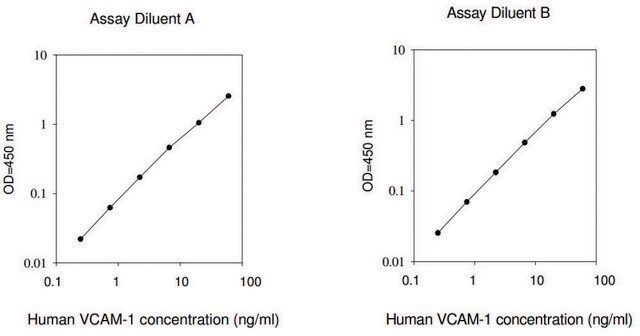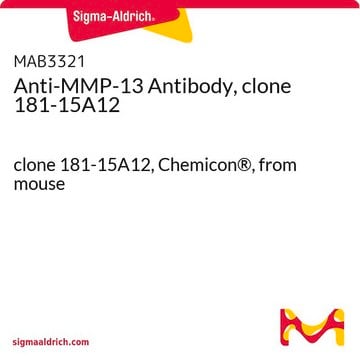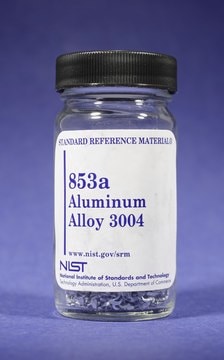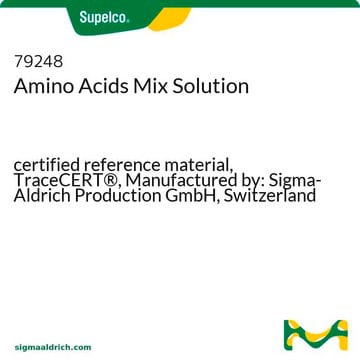MAB3315
Anti-MMP-7 Antibody, clone 141-7B2
clone 141-7B2, Chemicon®, from mouse
Sinonimo/i:
Matrilysin
Autenticatiper visualizzare i prezzi riservati alla tua organizzazione & contrattuali
About This Item
Codice UNSPSC:
12352203
eCl@ss:
32160702
NACRES:
NA.41
Prodotti consigliati
Origine biologica
mouse
Livello qualitativo
Forma dell’anticorpo
purified immunoglobulin
Clone
141-7B2, monoclonal
Reattività contro le specie
human
Produttore/marchio commerciale
Chemicon®
tecniche
ELISA: suitable
immunohistochemistry: suitable (paraffin)
western blot: suitable
Isotipo
IgG1κ
N° accesso NCBI
N° accesso UniProt
Condizioni di spedizione
dry ice
modifica post-traduzionali bersaglio
unmodified
Specificità
The antibody specifically reacts with precursor form of human MMP-7. Does not cross-react with the active forms of human MMP-7 and human MMP-1, 2, 3, 8, 9 and 13.
Immunogeno
Rectal carcinoma (SW837) cells.
Applicazioni
Anti-MMP-7 Antibody, clone 141-7B2 is an antibody against MMP-7 for use in ELISA, WB, IH(P).
Immunoblotting: 10 μg/mL Molecular weight band around 30kDa.
Immunohistochemistry on paraffin-embedded tissue sections: 4-20 μg/mL
EIA
Optimal working dilutions must be determined by end user.
Immunohistochemistry on paraffin-embedded tissue sections: 4-20 μg/mL
EIA
Optimal working dilutions must be determined by end user.
Research Category
Cell Structure
Cell Structure
Research Sub Category
MMPs & TIMPs
MMPs & TIMPs
Stato fisico
Format: Purified
Purified immunoglobulin. Liquid in 0.1 M sodium phosphate buffer, pH 7.0 containing 2% protease-free bovine serum albumin.
Stoccaggio e stabilità
Maintain at -20°C in undiluted aliquots for up to 12 months from date of receipt. Avoid repeated freeze/thaw cycles.
Altre note
Concentration: Please refer to the Certificate of Analysis for the lot-specific concentration.
Note legali
CHEMICON is a registered trademark of Merck KGaA, Darmstadt, Germany
Esclusione di responsabilità
Manufactured by Daiichi Fine Chemical Co., Ltd
Unless otherwise stated in our catalog or other company documentation accompanying the product(s), our products are intended for research use only and are not to be used for any other purpose, which includes but is not limited to, unauthorized commercial uses, in vitro diagnostic uses, ex vivo or in vivo therapeutic uses or any type of consumption or application to humans or animals.
Unless otherwise stated in our catalog or other company documentation accompanying the product(s), our products are intended for research use only and are not to be used for any other purpose, which includes but is not limited to, unauthorized commercial uses, in vitro diagnostic uses, ex vivo or in vivo therapeutic uses or any type of consumption or application to humans or animals.
Codice della classe di stoccaggio
12 - Non Combustible Liquids
Classe di pericolosità dell'acqua (WGK)
WGK 2
Punto d’infiammabilità (°F)
Not applicable
Punto d’infiammabilità (°C)
Not applicable
Certificati d'analisi (COA)
Cerca il Certificati d'analisi (COA) digitando il numero di lotto/batch corrispondente. I numeri di lotto o di batch sono stampati sull'etichetta dei prodotti dopo la parola ‘Lotto’ o ‘Batch’.
Possiedi già questo prodotto?
I documenti relativi ai prodotti acquistati recentemente sono disponibili nell’Archivio dei documenti.
DSG3 facilitates cancer cell growth and invasion through the DSG3-plakoglobin-TCF/LEF-Myc/cyclin D1/MMP signaling pathway.
Chen, YJ; Lee, LY; Chao, YK; Chang, JT; Lu, YC; Li, HF; Chiu, CC; Li, YC; Li, YL; Chiou et al.
Testing null
Yali Zhai et al.
The American journal of pathology, 160(4), 1229-1238 (2002-04-12)
In various cancers, inactivating mutations in the adenomatous polyposis coli or Axin tumor suppressor proteins or activating mutations in beta-catenin's amino-terminal domain elevate beta-catenin levels, resulting in marked effects on T-cell factor (TCF)-regulated transcription. Several candidate beta-catenin/TCF-regulated genes in cancer
Prognostic value of E-cadherin, beta-catenin, MMPs (7 and 9), and TIMPs (1 and 2) in patients with colorectal carcinoma.
Fernanda Roca, Laura V Mauro, Ana Morandi, Fernando Bonadeo, Carlos Vaccaro et al.
Journal of Surgical Oncology null
Expression of matrix metalloproteinases and tissue inhibitors of metalloproteinases in HTLV-I-associated myelopathy.
Umehara, F, et al.
Journal of Neuropathology and Experimental Neurology, 57, 839-849 (1998)
Anna Kerola et al.
The journal of pathology. Clinical research, 2(3), 187-198 (2016-08-09)
The molecular mechanisms underlying progressive liver fibrosis following surgical treatment of biliary atresia (BA) remain unclear. Our aim was to address hepatic gene and protein expression and serum levels of matrix metalloproteinases (MMPs) and their tissue inhibitors (TIMPs) after successful
Il team dei nostri ricercatori vanta grande esperienza in tutte le aree della ricerca quali Life Science, scienza dei materiali, sintesi chimica, cromatografia, discipline analitiche, ecc..
Contatta l'Assistenza Tecnica.